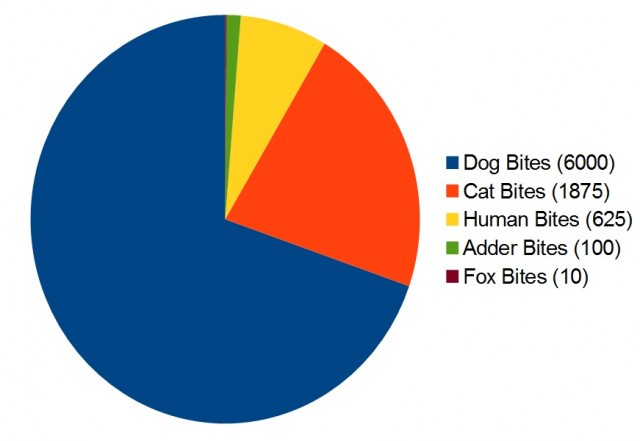I came home yesterday evening to see the fox bites off babies finger story all over the net, followed by Boris Johnson’s call for councils to do more about this ‘the growing problem of urban foxes’ which are a ‘a pest and a menace, particularly in our cities.’ Interesting that his party (The Conservatives for those who are unaware) are trying to repeal a ban on fox hunting with dogs and this story comes after David Cameron admitted there was not enough support to bring back fox hunting with dogs. I’m not saying this all a set up, but I certainly expect foxes to get more bad PR from this government and certain elements of the press who support the hunting ban being repealed.
There was a spate of these fox attacking humans stories in 2010, after 2 twins were reportedly attacked in their bedroom.
There were also the following stories afterwards:
Fox bites woman’s ear as she sleeps
Woman tells of horror at being bitten by a fox on two separate nights
Parents of toddler bitten by fox describe ‘brave little boy
Angler scarred for life by a FOX when it bit his face while he lay asleep in tent
In 2010 there was even this story of a Judges shoes being eaten by a fox!‘
There have been other stories since 2010 too including:
Fox bites off woman’s finger (slight exaggeration in this one, see the photo)
And recently Terror as fox bites toddler, 3, on sledge and tries to drag him away
All this perhaps looks pretty bad. However this needs be put in perspective. Research by DEFRA reports 250,000 dog bites occurring each year in the UK.
The NHS web page quotes the following figure:
The three most common causes of bites are:
- dog bites, which account for around four out of five cases (80%)
- cat bites, which account for around one-in-seven cases (15%)
- human bites, which account for around one-in-20 cases (5%)
Further down it reports:
It is hard to estimate how common bites are as records are usually only kept of bites that were serious enough to require hospital treatment; which in England is around 6,000 cases of dog bites and 2,500 cases due to other bites, including human.
If we take the total bites as 8500, the 6000 dog bites actually work out as around 70% of this, probably due to rounding up for simplicity, using ‘4 out of 5’ to illustrate numbers. This leaves 2500 ‘other bites’ which adds up to around 30%, which doesn’t match with the above 15% by cats and 5% by humans. So to keep things simple I’ll take the cats bites as 15% of 8500 which is 1875 and human bites as 5% of 8500 which is 625. We can add in the estimated 100 bites a year by adders too. If we take all the fox stories in 2010 (5) and assume all are accurate, and due to the fuss after the twins were attacked, all the attacks were reported (which based on the fact shoe story was reported they probably were) and double this figure, as they pretty much all took place in the last 6 months of 2010, that gives us 10 fox attacks a year.
If put this all this data together we can get this chart:
Puts these fox attacks/bites in perspective really. On average, a UK resident is nearly 600 times more likely to be bitten by a dog, 187 times by a cat and 62 times more likely to be bitten by another human than a fox!










[Quote] I’m not saying this all a set up
OK I’ll say it. IT’S A SET UP!
These stories only surface when a hunting vote has failed, when the hunts have been admonished, when an MP fails to get the RSPCA censured by the Charity Commission.
It’s no coincidence that as soon as the PTES start pushing hedgehog decline that people start to surface blaming it on badgers. How convenient, just in time for the cull to start.
It’s so transparent it’s untrue.
Bring back fox hunting, support the countryside
They still have hunts in the countryside, fancy dress and all, it’s just that they’re not allowed to have dogs rip foxes apart at the end of them. Fox hunting as we knew it is where it belongs, in the dustbin of history.
How is hunting saving the coutryside? If you believe this, perhaps a well constructed argument rather than a throwaway comment would be useful.
What good will that do “Deb”…these are urban foxes…stop interfering in urban issues and don’t comment on what you don’t understand. You country criminals are all alike, you say it doesn’t hurt anybody, but then you could say the same of dog fighting, cock fighting and starving and mistreating a horse.
Why do you bunny huggers seem to equate hunting with mistreating horses? Surely if our horses weren’t in any fit condition to ride out we wouldn’t be hunting them. All of the horses you’ll see out on a day’s hunting are in peak condition, we wouldn’t take a horse out that wasn’t sound.
An urban fox is completely different to a countryside fox, something which you lot don’t seem to understand when you keep dumping the mangy fleabitten specimens out of town. It can’t fend for itself after years of being hand fed, used to scavenging out of bins and has no fear of man. Usually they wind up at the wrong end of .220 after a night’s lamping, so your rehabilitation really works well there!
Really “jinxy”? Urban foxes are completely reliant on human hand outs and unable to fend for themselves? Just, I suppose, like cats — having been raised by a human, with food provided on demand — are incapable of catching birds, mice, reptiles, etc. Of course they can. The fact that many foxes *choose* to opt for an easy meal doesn’t mean they’re unable to catch prey themselves. Indeed, we have ample evidence from dietary studies of foxes in London, Bristol, Oxford and Southampton (to name a few cities) that show around about one-third of a typical urban fox’s diet is composed of so-called ‘wild caught’ food; by this we mean birds, small mammals, frogs, insects, etc. There is also no evidence that urban foxes are, on average, any more or less healthy than those living in rural areas. Certainly the vast majority of the ones I’ve seen in West Sussex and Hampshire towns and cities have been in good condition.
In the end, the reason that we see such unfortunate fox-human encounters is almost certainly because generations of foxes have grown up side-by-side with humans and come to learn that they have little to fear from us; that these bipedal primates can even be a cushty source of chow. It’s not surprising that, as a result, some foxes (and I do mean *some* because, whether we like it or not, each fox is an individual – some bold, some timid, some passive, some aggressive) have grown bolder and are willing to take more liberties in the search for an easy meal. Foxes aren’t stupid; they don’t mistake some random human for one who has previously fed them, nor do they mistake one random house for another they’ve be encouraged into before. They do, however, understand that if one human has fed them before, or they’ve found food in one house before, there’s a chance that another human, or another house, might yield similar rewards. In some cases, it may be that they’ve never been in a house before, or been fed by a person, but they’re highly adaptable and may simply decide to try their luck. Unfortunately for them, centuries of living without the fear of large carnivores roaming the countryside has left many people complacent and, rather than acting on an understanding of the behaviour, they take offence and demand that anything that can potentially do them or their family harm — and doesn’t respect our boundaries — is removed.
Foxes are, however, extremely difficult to eradicate (look at Australia, for example) and arguably we shouldn’t even try. As Chris Packham said last week, we should celebrate the fact that there are some species that thrive when we lay down our concrete and tarmac over their former habitat.
Are there any instances of bites to babies being confirmed by DNA evidence? The only really likely occasion for fox bites is when humans deliberately confine foxes or attempt to domesticate them. Usually only very sick wild animals tolerate humans.